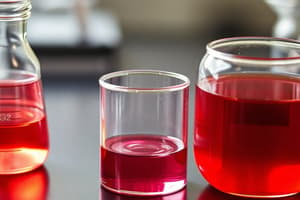Podcast
Questions and Answers
What is the main difference between mixtures and compounds?
What is the main difference between mixtures and compounds?
- Mixtures involve chemical bonding, compounds do not involve bonding.
- Mixtures can be separated by physical means, compounds can only be separated by chemical means. (correct)
- Mixtures always have uniform composition, compounds always have non-uniform composition.
- Mixtures have fixed compositions, compounds have variable compositions.
Which method is best suited for separating a dissolved solid from a solution?
Which method is best suited for separating a dissolved solid from a solution?
- Evaporation (correct)
- Distillation
- Filtration
- Chromatography
In which type of bond do atoms share electrons to stick together?
In which type of bond do atoms share electrons to stick together?
- Ionic bonds
- Covalent bonds (correct)
- Hydrogen bonds
- Metallic bonds
What is the characteristic property of metallic bonds?
What is the characteristic property of metallic bonds?
Which of the following substances is an example of an ionic bond?
Which of the following substances is an example of an ionic bond?
What is the main characteristic property of hydrogen bonds?
What is the main characteristic property of hydrogen bonds?
Which type of bond involves atoms giving or taking electrons to stick together?
Which type of bond involves atoms giving or taking electrons to stick together?
What is the main distinguishing feature between filtration and distillation?
What is the main distinguishing feature between filtration and distillation?
Which type of bond is most likely to occur in water (H2O)?
Which type of bond is most likely to occur in water (H2O)?
Which method is best suited for separating substances based on their movement through a medium?
Which method is best suited for separating substances based on their movement through a medium?
Flashcards are hidden until you start studying
Study Notes
Mixtures
- A mixture is a combination of two or more substances that are not chemically bonded and can be separated by physical means.
- Mixtures can be homogeneous (uniform composition) or heterogeneous (non-uniform composition).
- Methods for separating mixtures include:
Filtration
- Separates solids from liquids in a heterogeneous mixture
Evaporation
- Separates a dissolved solid from a solution by heating
Distillation
- Separates substances based on their boiling points
Chromatography
- Separates substances based on their movement through a medium
Compounds
- A compound is a substance formed when two or more elements are chemically bonded together.
- Characteristics of compounds:
- Have fixed compositions
- Properties differ from those of the individual elements
- Can only be separated into their elements by chemical means
Types of Bonds in Compounds
Ionic Bonds
- Formed when atoms give or take electrons to stick together
- Example: Salt (NaCl), where sodium gives an electron to chlorine
Covalent Bonds
- Formed when atoms share electrons to stick together
- Example: Water (H2O), where oxygen shares electrons with hydrogen
Metallic Bonds
- Formed when metals share their electrons with many other atoms, creating a shared pool of electrons
- Example: Copper (Cu), which is bendy and good at carrying electricity
Hydrogen Bonds
- A weak bond formed when a hydrogen atom gets close to a negative part of another molecule
- Example: Water molecules sticking to each other, making water liquid at room temperature
Studying That Suits You
Use AI to generate personalized quizzes and flashcards to suit your learning preferences.





